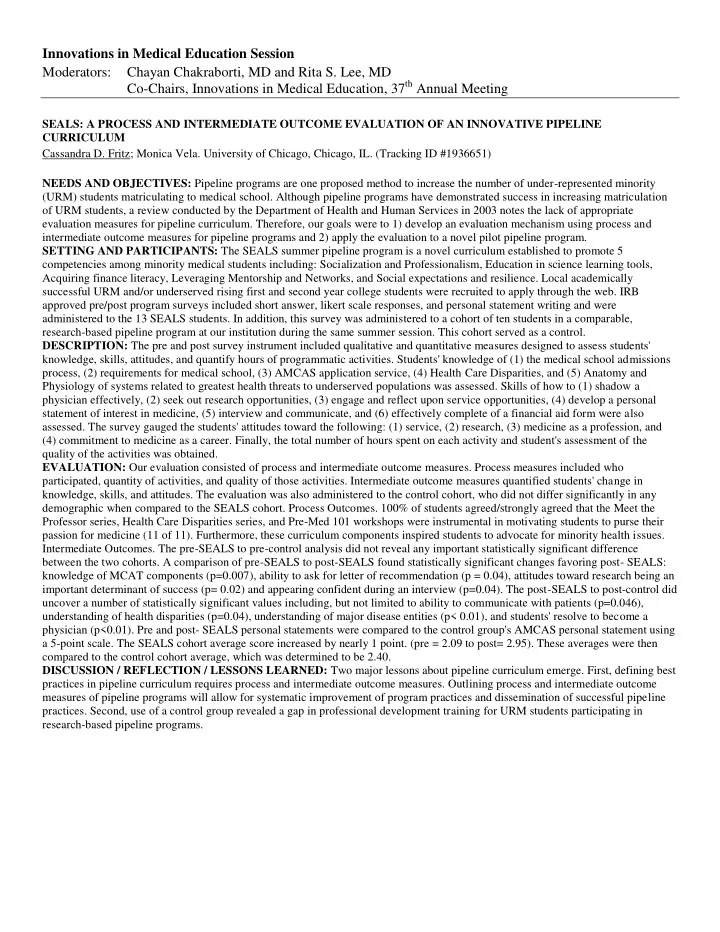

Innovations in Medical Education Session Moderators: Chayan Chakraborti, MD and Rita S. Lee, MD Co-Chairs, Innovations in Medical Education, 37 th Annual Meeting SEALS: A PROCESS AND INTERMEDIATE OUTCOME EVALUATION OF AN INNOVATIVE PIPELINE CURRICULUM Cassandra D. Fritz; Monica Vela. University of Chicago, Chicago, IL. (Tracking ID #1936651) NEEDS AND OBJECTIVES: Pipeline programs are one proposed method to increase the number of under-represented minority (URM) students matriculating to medical school. Although pipeline programs have demonstrated success in increasing matriculation of URM students, a review conducted by the Department of Health and Human Services in 2003 notes the lack of appropriate evaluation measures for pipeline curriculum. Therefore, our goals were to 1) develop an evaluation mechanism using process and intermediate outcome measures for pipeline programs and 2) apply the evaluation to a novel pilot pipeline program. SETTING AND PARTICIPANTS: The SEALS summer pipeline program is a novel curriculum established to promote 5 competencies among minority medical students including: Socialization and Professionalism, Education in science learning tools, Acquiring finance literacy, Leveraging Mentorship and Networks, and Social expectations and resilience. Local academically successful URM and/or underserved rising first and second year college students were recruited to apply through the web. IRB approved pre/post program surveys included short answer, likert scale responses, and personal statement writing and were administered to the 13 SEALS students. In addition, this survey was administered to a cohort of ten students in a comparable, research-based pipeline program at our institution during the same summer session. This cohort served as a control. DESCRIPTION: The pre and post survey instrument included qualitative and quantitative measures designed to assess students' knowledge, skills, attitudes, and quantify hours of programmatic activities. Students' knowledge of (1) the medical school admissions process, (2) requirements for medical school, (3) AMCAS application service, (4) Health Care Disparities, and (5) Anatomy and Physiology of systems related to greatest health threats to underserved populations was assessed. Skills of how to (1) shadow a physician effectively, (2) seek out research opportunities, (3) engage and reflect upon service opportunities, (4) develop a personal statement of interest in medicine, (5) interview and communicate, and (6) effectively complete of a financial aid form were also assessed. The survey gauged the students' attitudes toward the following: (1) service, (2) research, (3) medicine as a profession, and (4) commitment to medicine as a career. Finally, the total number of hours spent on each activity and student's assessment of the quality of the activities was obtained. EVALUATION: Our evaluation consisted of process and intermediate outcome measures. Process measures included who participated, quantity of activities, and quality of those activities. Intermediate outcome measures quantified students' change in knowledge, skills, and attitudes. The evaluation was also administered to the control cohort, who did not differ significantly in any demographic when compared to the SEALS cohort. Process Outcomes. 100% of students agreed/strongly agreed that the Meet the Professor series, Health Care Disparities series, and Pre-Med 101 workshops were instrumental in motivating students to purse their passion for medicine (11 of 11). Furthermore, these curriculum components inspired students to advocate for minority health issues. Intermediate Outcomes. The pre-SEALS to pre-control analysis did not reveal any important statistically significant difference between the two cohorts. A comparison of pre-SEALS to post-SEALS found statistically significant changes favoring post- SEALS: knowledge of MCAT components (p=0.007), ability to ask for letter of recommendation (p = 0.04), attitudes toward research being an important determinant of success (p= 0.02) and appearing confident during an interview (p=0.04). The post-SEALS to post-control did uncover a number of statistically significant values including, but not limited to ability to communicate with patients (p=0.046), understanding of health disparities (p=0.04), understanding of major disease entities (p< 0.01), and students' resolve to become a physician (p<0.01). Pre and post- SEALS personal statements were compared to the control group's AMCAS personal statement using a 5-point scale. The SEALS cohort average score increased by nearly 1 point. (pre = 2.09 to post= 2.95). These averages were then compared to the control cohort average, which was determined to be 2.40. DISCUSSION / REFLECTION / LESSONS LEARNED: Two major lessons about pipeline curriculum emerge. First, defining best practices in pipeline curriculum requires process and intermediate outcome measures. Outlining process and intermediate outcome measures of pipeline programs will allow for systematic improvement of program practices and dissemination of successful pipeline practices. Second, use of a control group revealed a gap in professional development training for URM students participating in research-based pipeline programs.
Recommend
More recommend